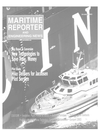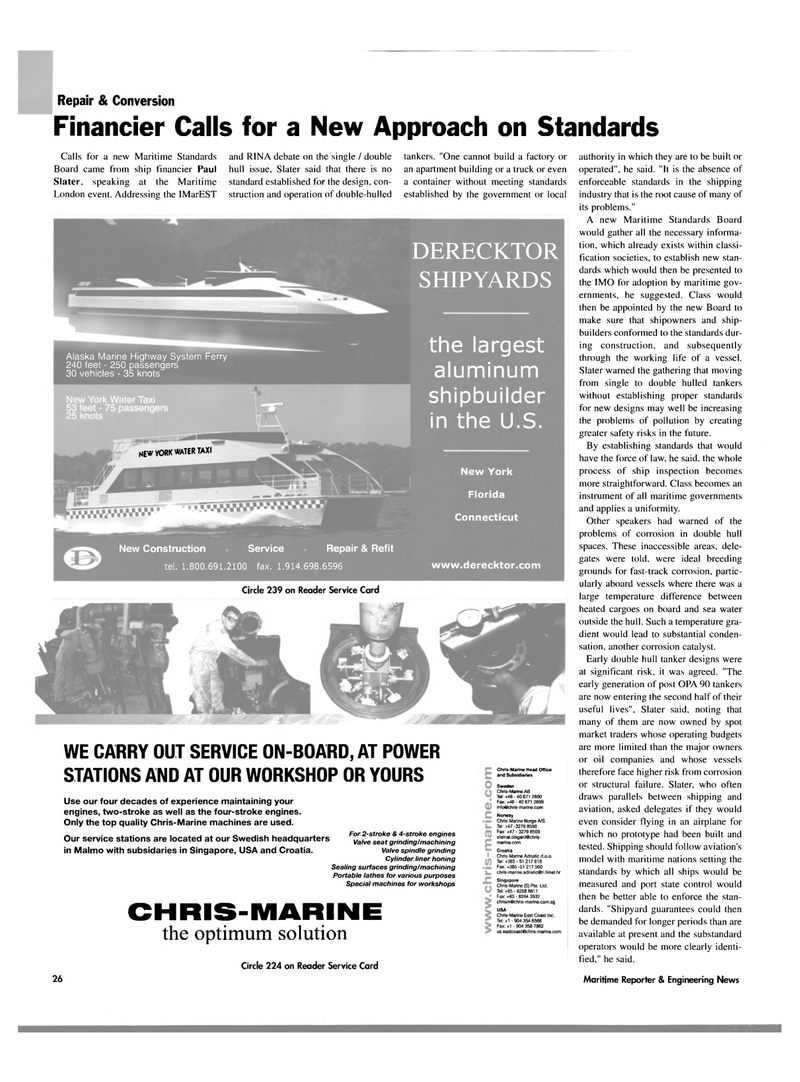
Page 28: of Maritime Reporter Magazine (October 2003)
Read this page in Pdf, Flash or Html5 edition of October 2003 Maritime Reporter Magazine
Repair & Conversion
Financier Calls for a New Approach on Standards
Calls for a new Maritime Standards
Board came from ship financier Paul
Slater, speaking at the Maritime
London event. Addressing the IMarEST and RINA debate on the single / double hull issue. Slater said that there is no standard established for the design, con- struction and operation of double-hulled tankers. "One cannot build a factory or an apartment building or a truck or even a container without meeting standards established by the government or local
DERECKTOR
SHIPYARDS the largest aluminum shipbuilder in the U.S.
New York
Florida
Connecticut
New Construction Service Repair & Refit tel. 1.800.691.2100 fax. 1.914.698.6596 www.derecktor.com
Circle 239 on Reader Service Card
WE CARRY OUT SERVICE ON-BOARD, AT POWER
STATIONS AND AT OUR WORKSHOP OR YOURS
Use our four decades of experience maintaining your engines, two-stroke as well as the four-stroke engines.
Only the top quality Chris-Marine machines are used.
Our service stations are located at our Swedish headquarters in Malmo with subsidaries in Singapore, USA and Croatia.
For 2-stroke & 4-stroke engines
Valve seat grinding/machining
Valve spindle grinding
Cylinder liner honing
Sealing surfaces grinding/machining
Portable lathes for various purposes
Special machines for workshops
CHRIS-MARINE the optimum solution
Chris-Marine Head Office and Subsidiaries
Sweden
Chris-Marine AB
Tel: +46 - 40 671 2600
Fax: +46 - 40 671 2699 [email protected]
Norway
Chris-Marine Norge A/S
Tel: +47 -3279 8590
Fax: +47 - 3279 8509 steinar.olsgard@chris- marine.com
Croatia
Chris-Marine Adriatic d.o.o.
Tel: +385-51 217 818
Fax:+385 -51 217 560 [email protected]
Singapore
Chris-Marine (S) Pte. Ltd.
Tel: +65 - 6268 8611
Fax: +65 - 6264 3932 [email protected]
USA
Chris-Marine East Coast Inc.
Tel: +1 - 904 354 6566
Fax:+1 -904 358 7862 [email protected]
Circle 224 on Reader Service Card 26 authority in which they are to be built or operated", he said. "It is the absence of enforceable standards in the shipping industry that is the root cause of many of its problems."
A new Maritime Standards Board would gather all the necessary informa- tion, which already exists within classi- fication societies, to establish new stan- dards which would then be presented to the IMO for adoption by maritime gov- ernments, he suggested. Class would then be appointed by the new Board to make sure that shipowners and ship- builders conformed to the standards dur- ing construction, and subsequently through the working life of a vessel.
Slater warned the gathering that moving from single to double hulled tankers without establishing proper standards for new designs may well be increasing the problems of pollution by creating greater safety risks in the future.
By establishing standards that would have the force of law. he said, the whole process of ship inspection becomes more straightforward. Class becomes an instrument of all maritime governments and applies a uniformity.
Other speakers had warned of the problems of corrosion in double hull spaces. These inaccessible areas, dele- gates were told, were ideal breeding grounds for fast-track corrosion, partic- ularly aboard vessels where there was a large temperature difference between heated cargoes on board and sea water outside the hull. Such a temperature gra- dient would lead to substantial conden- sation, another corrosion catalyst.
Early double hull tanker designs were at significant risk, it was agreed. "The early generation of post OPA 90 tankers are now entering the second half of their useful lives". Slater said, noting that many of them are now owned by spot market traders whose operating budgets are more limited than the major owners or oil companies and whose vessels therefore face higher risk from corrosion or structural failure. Slater, who often draws parallels between shipping and aviation, asked delegates if they would even consider flying in an airplane for which no prototype had been built and tested. Shipping should follow aviation's model with maritime nations setting the standards by which all ships would be measured and port state control would then be better able to enforce the stan- dards. "Shipyard guarantees could then be demanded for longer periods than are available at present and the substandard operators would be more clearly identi- fied," he said.
Maritime Reporter & Engineering News
Alaska Marine Highway System Ferry 240 feet - 250 passengers 30 vehicles - 35 knots
New York Water Taxi
NEW YORK WATER TAXI

 27
27

 29
29
